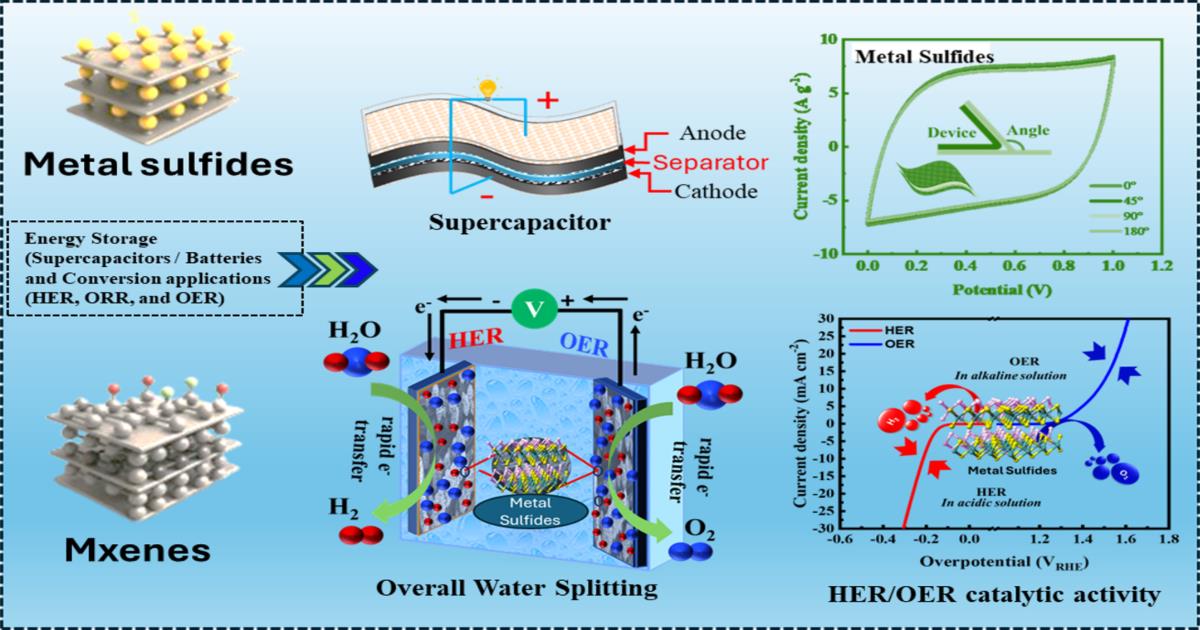- 4.3Impact Factor
- 9.2CiteScore
- 16 daysTime to First Decision
Metal Sulfides and MXene-Based Nanostructured Materials for High-Performance Supercapacitors and Overall Water Splitting
This special issue belongs to the section “2D and Carbon Nanomaterials“.
Special Issue Information
Dear Colleagues,
The rapid global shift towards sustainable energy solutions necessitates breakthroughs in energy storage and conversion technologies. This Special Issue, titled "Metal Sulfides and MXene-Based Nanostructured Materials for High-Performance Supercapacitors and Overall Water Splitting," highlights cutting-edge research at the nexus of supercapacitors and water splitting technologies.
Supercapacitors are at the forefront of next-generation energy storage systems, offering high power density, fast charge–discharge rates, and long cycle life. Simultaneously, water splitting has emerged as a pivotal technology for green hydrogen production, leveraging renewable energy sources for sustainable fuel generation. The integration of innovative materials and advanced techniques is driving significant progress in both fields, opening new pathways for efficient energy storage and conversion.
This Special Issue welcomes contributions that explore the design, synthesis, and application of advanced materials such as metal oxides, sulfides, carbides, and hybrid nanostructures for supercapacitors, photocatalysts, and electrocatalysts. Topics include the following:
- Novel electrode materials and architectures for supercapacitors.
- Catalyst innovations for overall water splitting, including oxygen and hydrogen evolution reactions (OER/HER).
- Synergistic approaches combining supercapacitor storage and water-splitting technologies.
- Theoretical and experimental insights into charge transfer mechanisms and material performance.
- Strategies for enhancing energy density, stability, and scalability of these systems.
Through this Special Issue, we aim to present a comprehensive overview of emerging trends and breakthroughs in energy storage and hydrogen generation. Researchers, scientists, and engineers are encouraged to contribute their findings to advance the global transition towards clean and sustainable energy solutions.
Dr. Ghanshyam Gyawali
Dr. Ojha Gunendra Prasad
Guest Editors
Dr. Keshab Pandey
Guest Editor Assistant
Manuscript Submission Information
Manuscripts should be submitted online at www.mdpi.com by registering and logging in to this website. Once you are registered, click here to go to the submission form. Manuscripts can be submitted until the deadline. All submissions that pass pre-check are peer-reviewed. Accepted papers will be published continuously in the journal (as soon as accepted) and will be listed together on the special issue website. Research articles, review articles as well as short communications are invited. For planned papers, a title and short abstract (about 250 words) can be sent to the Editorial Office for assessment.
Submitted manuscripts should not have been published previously, nor be under consideration for publication elsewhere (except conference proceedings papers). All manuscripts are thoroughly refereed through a single-blind peer-review process. A guide for authors and other relevant information for submission of manuscripts is available on the Instructions for Authors page. Nanomaterials is an international peer-reviewed open access semimonthly journal published by MDPI.
Please visit the Instructions for Authors page before submitting a manuscript. The Article Processing Charge (APC) for publication in this open access journal is 2400 CHF (Swiss Francs). Submitted papers should be well formatted and use good English. Authors may use MDPI's English editing service prior to publication or during author revisions.
Keywords
- emerging materials
- supercapacitors
- hydrogen evolution reaction
- oxygen evolution reaction
- oxygen reduction reaction

Benefits of Publishing in a Special Issue
- Ease of navigation: Grouping papers by topic helps scholars navigate broad scope journals more efficiently.
- Greater discoverability: Special Issues support the reach and impact of scientific research. Articles in Special Issues are more discoverable and cited more frequently.
- Expansion of research network: Special Issues facilitate connections among authors, fostering scientific collaborations.
- External promotion: Articles in Special Issues are often promoted through the journal's social media, increasing their visibility.
- e-Book format: Special Issues with more than 10 articles can be published as dedicated e-books, ensuring wide and rapid dissemination.

